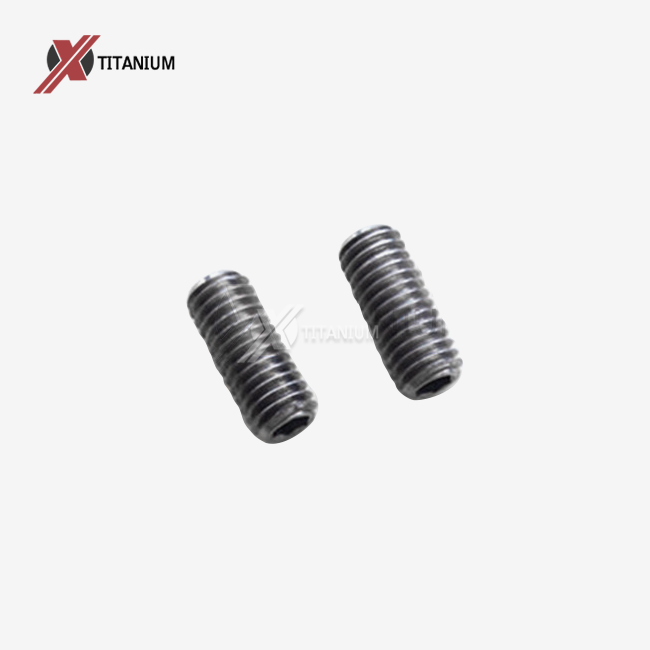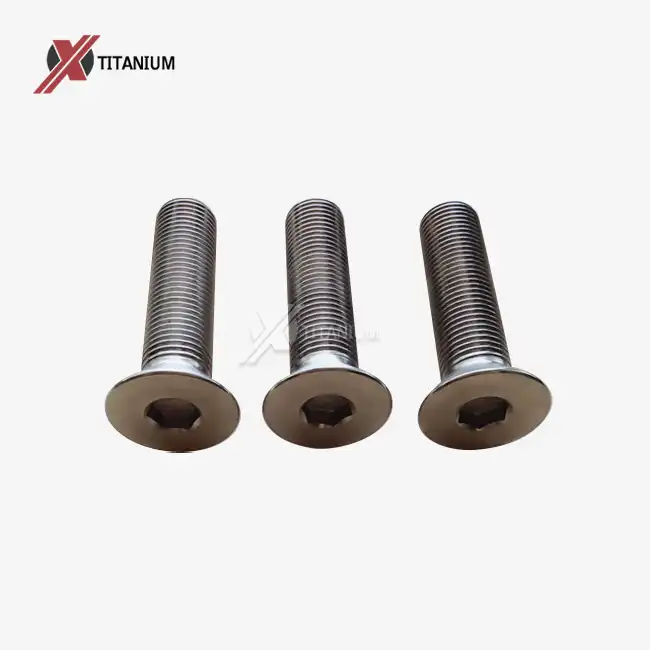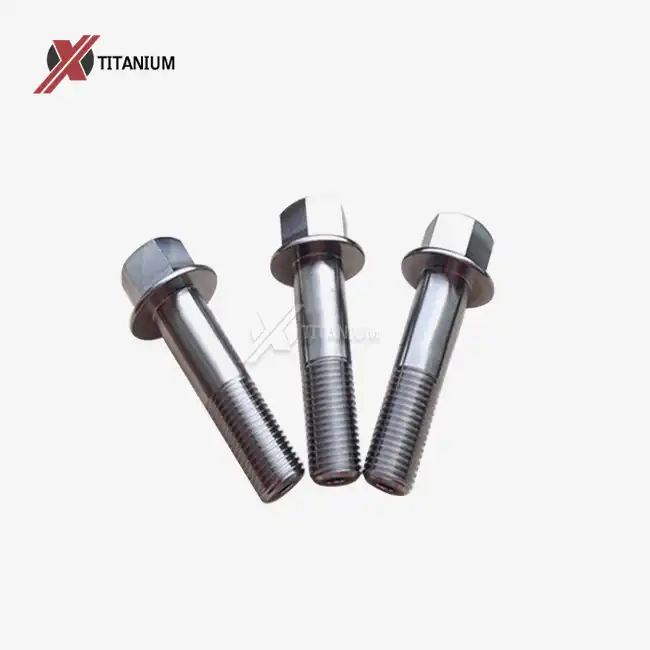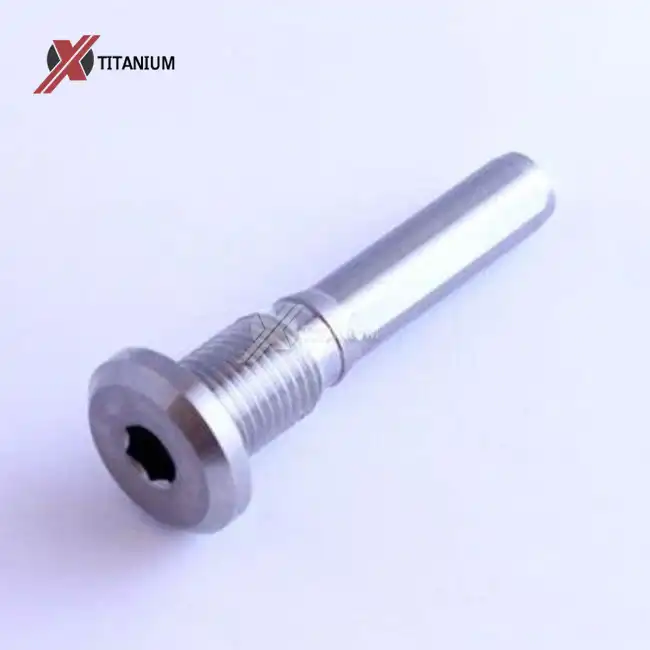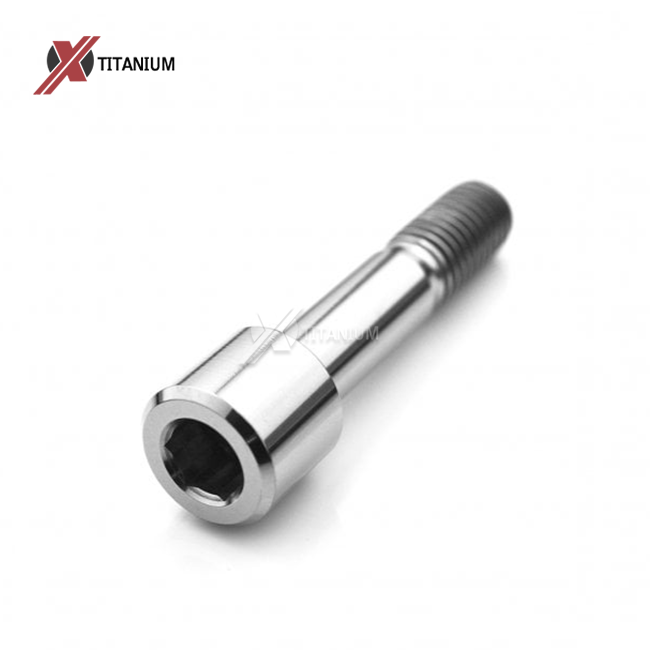The Unparalleled Advantages of Titanium Set Screws in Aerospace Applications
Exceptional Strength-to-Weight Ratio
Titanium set screws boast an impressive strength-to-weight ratio, a characteristic that sets them apart in the aerospace industry. This property allows engineers to design lighter yet robust structures, crucial for improving fuel efficiency and payload capacity. The density of titanium is approximately 60% that of steel, while maintaining comparable strength.
In practical terms, utilizing titanium set screws enables aerospace engineers to create structures that can withstand the immense forces experienced during takeoff, flight, and reentry, without compromising on weight. This balance is particularly critical in applications such as engine mounts, wing attachments, and fuselage components, where the screws must resist high tensile and shear stresses while contributing minimally to the overall mass of the vehicle.
Superior Corrosion Resistance
The aerospace environment is notoriously harsh, exposing materials to a wide range of corrosive elements. Titanium set screws excel in this domain due to their inherent resistance to corrosion. This property stems from titanium's ability to form a stable, protective oxide layer on its surface when exposed to oxygen. This layer acts as a barrier, preventing further oxidation and protecting the underlying metal from degradation.
In aerospace applications, this corrosion resistance is invaluable. Aircraft and spacecraft are frequently exposed to moisture, salt spray, and various chemicals used in maintenance and operation. Titanium set screws maintain their integrity in these conditions, ensuring long-term reliability and reducing the need for frequent replacements or maintenance.
Thermal Stability and Performance
Aerospace vehicles operate across a wide temperature spectrum, from the extreme cold of high altitudes to the intense heat generated during reentry or in engine compartments. Titanium set screws demonstrate remarkable thermal stability across this range. They maintain their mechanical properties at both cryogenic temperatures and in high-heat scenarios, making them versatile components in various aerospace systems.
This thermal stability manifests in several ways. Titanium has a low coefficient of thermal expansion, meaning it doesn't significantly change size or shape with temperature fluctuations. This property is crucial for maintaining precise fits and tolerances in aerospace assemblies. Additionally, titanium set screws retain their strength at elevated temperatures, a vital characteristic for components used in or near aircraft engines or in spacecraft subjected to the heat of atmospheric reentry.
Manufacturing Processes and Quality Control for Aerospace-Grade Titanium Set Screws
Precision CNC Machining
The production of aerospace-grade titanium set screws demands the utmost precision and consistency. Computer Numerical Control (CNC) machining is the preferred method for manufacturing these critical components. This advanced manufacturing technique allows for the creation of set screws with incredibly tight tolerances, ensuring each piece meets the exacting standards required for aerospace applications.
CNC machining of titanium set screws involves sophisticated multi-axis machines capable of performing complex operations with micron-level accuracy. The process begins with high-purity titanium alloy stock, typically Grade 5 (Ti-6Al-4V), which is carefully selected for its optimal balance of strength and machinability.
Heat Treatment and Surface Finishing
After machining, titanium set screws undergo specialized heat treatment processes to enhance their mechanical properties. These treatments can include solution annealing and aging, which optimize the microstructure of the titanium alloy for maximum strength and durability. The specific heat treatment regimen is carefully tailored to the intended application of the set screws, whether they need to prioritize tensile strength, fatigue resistance, or fracture toughness.
Surface finishing is another critical aspect of the manufacturing process. Techniques such as electropolishing or anodizing can be employed to further improve the corrosion resistance and surface properties of the titanium set screws. Anodizing, in particular, can create a hardened surface layer that enhances wear resistance and provides additional protection against environmental factors. These surface treatments can also be customized to meet specific aerospace requirements, such as electrical conductivity or non-reflective properties for certain applications.
Rigorous Quality Control and Testing
The aerospace industry demands the highest levels of quality assurance for all components, and titanium set screws are no exception. Manufacturers implement comprehensive quality control protocols throughout the production process. This includes thorough material verification to ensure the titanium alloy meets compositional standards, dimensional inspections using high-precision measurement tools, and non-destructive testing methods such as X-ray or ultrasonic inspection to detect any internal defects.
Mechanical testing is a crucial part of the quality control process. Set screws are subjected to a battery of tests to verify their performance under various conditions. These may include tensile strength tests, fatigue cycling, and environmental exposure simulations. Additionally, lot sampling and statistical process control techniques are employed to ensure consistency across production runs.
Future Trends and Innovations in Titanium Set Screw Technology for Aerospace
Advanced Alloy Development
The aerospace industry's relentless pursuit of improved performance is driving continuous innovation in titanium alloy development. Researchers and materials scientists are exploring new compositions and processing techniques to create titanium alloys with even more favorable properties for aerospace applications. These next-generation alloys aim to push the boundaries of strength-to-weight ratios, temperature resistance, and durability.
One promising area of research involves beta titanium alloys, which offer potential advantages in terms of formability and heat treatment response. These alloys could lead to set screws with enhanced mechanical properties and easier manufacturing processes. Another focus is on developing nanostructured titanium alloys, which could provide unprecedented combinations of strength and toughness.
Additive Manufacturing Technologies
Additive manufacturing, or 3D printing, is revolutionizing many aspects of aerospace production, and titanium set screws are no exception. While traditional CNC machining remains the standard for most aerospace-grade fasteners, additive manufacturing techniques are rapidly evolving to produce complex titanium components with intricate geometries that were previously impossible or impractical to manufacture.
For titanium set screws, additive manufacturing offers the potential for customized designs tailored to specific applications. This could include integrated features such as specialized thread profiles, weight-saving internal structures, or even embedded sensors for real-time monitoring. As additive manufacturing technologies mature and quality control processes are refined, we may see a shift towards more localized, on-demand production of titanium set screws, reducing lead times and inventory requirements for aerospace manufacturers.
Smart Fastener Technologies
The future of titanium set screws in aerospace may lie in the integration of smart technologies. Researchers are exploring ways to incorporate sensors and monitoring capabilities directly into fasteners, creating "smart" set screws that can provide real-time data on structural health, load conditions, and potential failures. These advanced fasteners could revolutionize maintenance practices and enhance safety in aerospace applications.
Imagine titanium set screws equipped with miniature strain gauges or piezoelectric sensors that can detect and report on stress levels or vibrations in critical assemblies. Such technology could enable predictive maintenance strategies, allowing engineers to address potential issues before they lead to failures. Additionally, smart fasteners could play a role in structural health monitoring systems, providing valuable data for assessing the overall integrity of aerospace vehicles throughout their operational lifecycle.
Conclusion
Titanium set screws have become an indispensable component in aerospace engineering, offering a unique combination of strength, lightweight properties, and corrosion resistance. As the aerospace industry continues to push the boundaries of performance and efficiency, these fasteners will undoubtedly play an increasingly critical role. The ongoing advancements in materials science, manufacturing techniques, and smart technologies promise to further enhance the capabilities of titanium set screws, enabling new levels of safety, reliability, and innovation in aerospace design.
For those seeking high-quality titanium set screws or other titanium products for aerospace applications, Baoji Chuanglian New Metal Material Co., Ltd. stands ready to meet your needs. With over a decade of experience in titanium product manufacturing and research, we offer a wide range of titanium fasteners and components tailored to the exacting standards of the aerospace industry. To learn more about our products or to discuss your specific requirements, please contact us at info@cltifastener.com or djy6580@aliyun.com.
